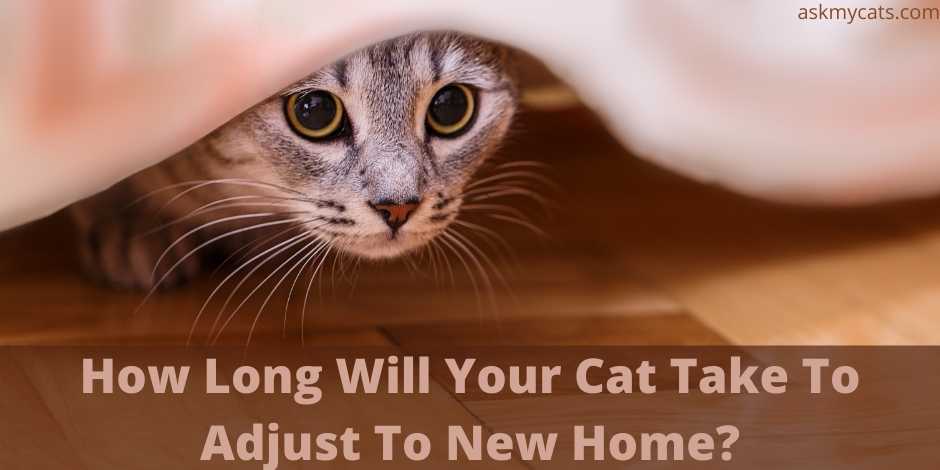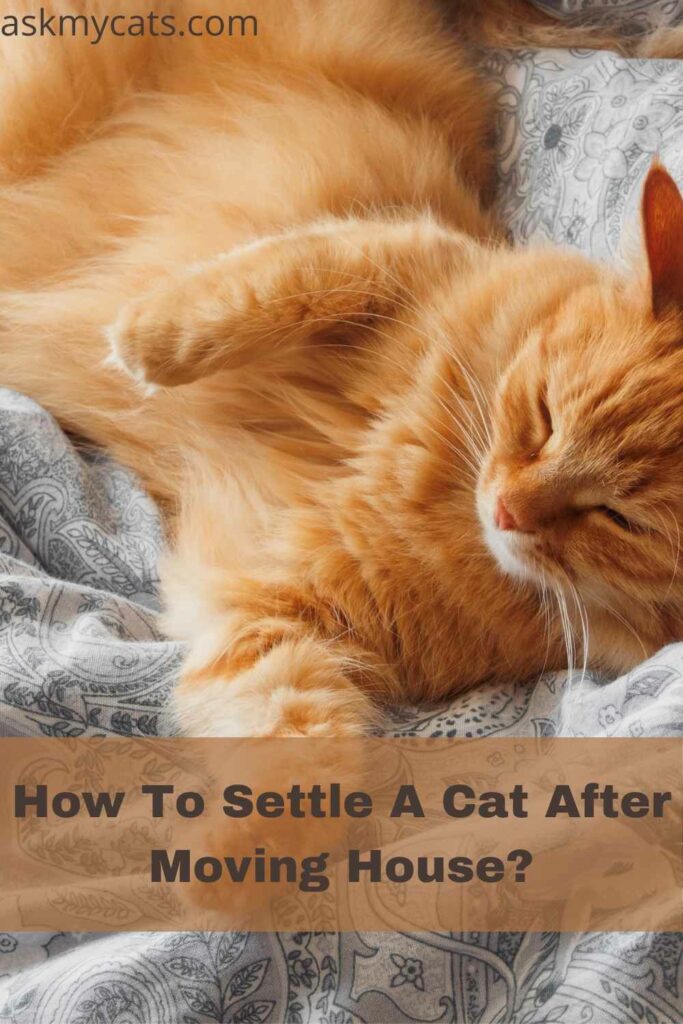The arrival of a cat in a home is a very exciting event, but this excitement shouldn’t overshadow the fact that cats will need calm, tranquillity, and secure space to feel safe and adapt.
It is essential to respect the time they need to feel safe as they start wanting to interact within the home.
Cats can usually take anywhere between 2 days to a whole week to adjust to a new home. However, depending upon your cat’s personality, it may even take a lesser or longer time to adjust to the new surroundings.
If you are a cat parent who is about to move into a new house with your cat, you might be wondering whether or not your cat will adjust to the new surroundings.
The entire event of moving houses in itself is stressful enough. Top that with the stress of an anxious pet – and it may seem like it’s too much to handle.
But don’t worry. You’ve come to just the right place. In this article, we will look into how moving affects cats, what you could expect from your cat’s behavior for the initial few days, and tips on how to help your cat adjust faster to the new surroundings.
Read along, as we try to make this big transitioning event a little less stressful for both you and your little furry buddy!


Give Your Cat the Perfect Day
Get the Free Ebook!
Do Cats Adjust To New Homes Easily?
Usually, cats do not adjust to new homes easily. The difficulty level that a cat faces to adjust to a new home depends upon the environment provided to it and the personality of the cat.
Cats tend to have great anxieties; they don’t usually do good with change. Some react to the commotion by hiding or attempting to flee at all costs.
Others express their dissatisfaction by aggressive behavior, litter box avoidance, excessive vocalization, or hunger strikes.
However, there are many ways in which you can make it easier and faster for your cat to adapt to a new home. We shall explain this further in the article.
Do Cats Get Sad When Rehomed?
Cats can get sad when they are rehomed. The process of rehoming might prove to be frighting for a cat. They tend to become sad or even depressed, missing their previous owners.

It is recommended to gradually assimilate the cat to their new environment as this will aid in their recovery and adjustment. Every cat will behave differently when they are rehomed, depending on its personality.
Many cats are first unaware of what is going on, and rehoming entails a lot of change in a short period of time.
Since the cat is being taken out from their territory and away from their home, the entire procedure could prove to be stressful and terrifying for them.
Many cats miss their owners after being rehomed. It is seen that many call for their previous owners for days and can become sad or depressed. An attempt to comfort or distract them in this stage could lead to aggressive behavior.
Fortunately, if you are able to find a lovely home for your cat, the recovery can be much faster, and the cat will adapt and adjust to its new home accordingly.
Also, check out Moving House with a Cat: Tips, Dos and Don’ts
Why Is My Cat Meowing A Lot After Moving?
The reason your cat is meowing a lot after moving could be the loss of their previous territory is making them anxious, and it is an unusual and troubling experience for them.
Some cats adjust to their new surroundings rapidly. Others’ behavior may change temporarily as they adjust to their new surroundings, and you may need to be patient with them.
After moving to a new home, your cat could start meowing a lot compared to before. This could happen because your cat is feeling vulnerable and skeptical of its surrounding.
This change in vocalization would usually not last long as your cat will slowly but surely adjust to its new environment.
Why Is My Cat Meowing At Night In New House?
Reasons, why your cat is meowing at night, could be both behavioral and medical. Behavioral reasons include loneliness, insufficient playing time, and attention-seeking.

The foremost thing that you need to do if your cat is meowing at night is to make sure that there aren’t any underlying medical conditions causing this.
Medical conditions that can cause your cat to meow at night could include: Thyroid disease, hypertension, kidney disease, bladder discomfort, and cognitive dysfunction are only some of the conditions that might cause nighttime vocalization.
Furthermore, if your cat’s vision or hearing deteriorates, they may get worried and refuse to be left alone or in the dark. This may lead to vocalization and attempts to enter the bedroom.
If there is no medical issue that is causing your cat to continuously speak at night, then there is usually no need to worry. This should last for a short period of time.
Your cat will soon return to its former self once it has adjusted to its surroundings.
Why Is My Cat Meowing First Night In New House?
During the first night in the new house, the meowing of your cat could be because your cat is not feeling familiar with the environment, your cat being scared, your cat may feel lonely, or seeing something outside like another cat.
The most common reason for this happening is your cat feeling is feeling uneasy because of new territory and resorting to meowing.
Another reason which could cause your cat to meow during the first night in the new house could be that if your cat is adopted or taken from a shelter, they could be missing their previous owners or interacting with other cats at the shelter.
Also, check out reasons behind i just adopted a cat and it won’t stop meowing
How Does Moving Affects Cats?
Moving can affect your cat in several different ways, including your cat meowing a lot, your cat scratching furniture, littering outside the litter box, or being overly aggressive.
Cats, who thrive on predictability, find change particularly challenging. Even minor changes can stress them. Cats develop strong bonds with their surroundings.
As a part of establishing their territory, they mark each room and piece of furniture with their scent.
Fortunately, a little forethought may go a long way toward keeping your cat — and your move — quiet and tranquil.
Does Cats Personality Changes After Moving?
Cat’s personality can change after moving to a new house. Your cat may show some unusual attention-calling behavior, such as meowing more than they usually do, destructive behavior, wanting to escape, and clinginess.
When a cat is stressed, it may begin to demand more and more attention from you. As previously discussed, cats are highly susceptible to stress, particularly when their routine is disrupted significantly.
Your cat may exhibit some strange attention-seeking behaviors after moving, such as meowing more than usual.
Cats are sophisticated creatures. They are creatures of habit, and they will always try to maintain the status quo. They may exhibit weird cat habits to cope with the stress of going out.
You can help them feel at ease in their new home if you give them enough attention.
You might observe changes in your cat’s personality, such as:
1. Your Cat May Show Excessive Clinginess
In a new environment, it is not uncommon for your cat to demand more of your attention than it usually does. This is because, in that new territory, you are the only familiar presence for your cat.
It may ask for more attention because it is seeking comfort and safety in your presence. Your presence may help it feel at ease in the new home.
2. Your Cat May Resort to Excessive Vocalization and Meowing
Meowing a lot, and louder than usual can be a way of your cat expressing its displeasure with the change. If you have ruled out any underlying medical conditions, then you don’t need to worry about excessive meowing.
As your cat slowly adjusts to its new environments, its vocalization and loud meowing will also stop.
3. Attention Seeking Behavior
Your cat may resort to scratching furniture and dropping objects off tables and shelves as a means to grab your attention. It might also start humping your leg or other inanimate objects such as blankets and pillows.
A good way to avoid such behavior is to stimulate your cat with toys and keep it engaged in playtime activities.
Cats do not like any change in the status quo of their lifestyle. Acting out in weird ways can be a way for your cat to cope with the stress of moving to a new home.
Can a Cat Get Traumatized After Moving to a New House?
Yes, Cats could become traumatized from moving as they are highly sensitive and protective of their territory. You can assist them in adjusting to the changes and reducing their stress by carefully planning and making early preparations.
Often the stress of moving and leaving their old territory or previous owners behind could prove to be a traumatizing experience for your cat. They may show unusual cat behavior and even become sad and depressed.
You can help your cat come out of this stage by giving them time, attention, and love, and not forcing the issue.
Is It Bad to Move a Cat from House to House Frequently?
Yes, It is pretty bad to move a cat from house to house as they are pretty attached to their territories. Moving your cat from house to house could leave a traumatizing experience for them.
If you move your cats surrounding once, then it is not an issue to be worried about as they will slowly adapt to their surroundings, but if your cat is being moved from house to house, this could have adverse effects on them.
Moving houses frequently will cause your cats to be highly unstable. They can become aggressive, start peeing everywhere, become less sociable, more meowing, and even make themselves depressed.
It is highly advisable not to move your cat from house to house on a frequent basis as this will be harmful to them.
How To Settle A Cat After Moving House?
To help settle your cat after moving house, you can do several things such as: Giving them their own space, surrounding them with familiar things, Stable routine, and introducing them slowly to new rooms.

Let us discuss all the points mentioned above in detail:
1. Give Them Their Own Space
Make a base for your cat in one of the rooms in your new home. This area should ideally be a spare room or a room that isn’t too crowded.
If your new cat is skittish, they likely prefer a quiet area where you can visit and sit with them as they adjust to their new surroundings.
Some confident and friendly cats may feel at ease in the living room if they enjoy being around people, but they will still want time and space in a new location to ensure that their surroundings are safe and to figure out where everything they require is located.
2. Surround Them With Familiar Things
In the room of your new house, place their favorite bed, blanket, toys, or any other object that is familiar to them. Placing items in the room that smell like you can also help.
You may, for example, include an old sweater or a running t-shirt that smells like you and like home. Because cats have a highly sensitive nose and rely on it to determine whether or not something is safe, this will comfort them during stressful situations.
3. Keep A Stable Routine
After moving to your new house, it is highly likely that you will be particularly busy with doing errands such as cleaning, unpacking, sorting stuff, etc.
Throughout this period, it is highly advisable that you try to keep your cat’s routine stable in terms of feeding, playing, and providing them with needed attention.
You need to give your cat extra love, care, and attention in order to tell them that everything is okay and reassure them about their sense of security.
4. Slowly Introduce Them To New Rooms
Introduce your cat to new rooms gradually while petting her and engaging in low-key hobbies such as reading or watching TV.
Offer your cat attention as she begins to explore, as well as some additional cat treats during playing to help her feel loved and at ease in your new home.
This could hugely help your cat adapt to your new home as she does this with your help and love.
Signs Your Cat is Adjusting to the New Home
It can be very promising and cheerful to see your cat adjust to the new home. Here are a few signs to look out for:
1. Positive Body Language
The most visibly noticeable way of knowing your cat is finally adjusting to the new home is by observing its body language.
Keep asking yourself the following questions:
- Is your cat walking around with more confidence?
- Is your cat feeling less scared and intimidated by the new surroundings?
- Is your cat comfortable in the room where you’ve set up his litterbox and bed?
- Is your cat enjoying staying in the new home?
- Has your cat stopped its strange, stress-induced behaviors?
When your answers to these questions start becoming positive, that’s when you can conclude that your cat is now finally adjusting to the new home.
2. Appetite
Other than your cat’s body language, its appetite can also be an indicator of whether or not your cat is feeling comfortable in the new home.
Stress, anxiety, frustration, and whatever else your cat may have felt while moving to the new home – all may be emotional responses to a big change, but they have an impact on physical health as well.
This means that the stress of moving doesn’t only impact your cat emotionally, but it also has an effect on your cat’s appetite and levels of activity.
For the first few days, until your cat adjusts to the new surroundings, your cat may eat more or less amount of food, and its meal times may also become erratic. It is important to establish a routine for meals and enforce it assertively in these days of transition.
Once your cat starts becoming comfortable in the new home, you’ll observe that its appetite is returning to normal levels, and the meal times are becoming more consistent and stable.
3. Activities
As stress makes your cat act strangely in the first days after moving, you might observe a change in your cat’s activity levels.
Your cat may become lethargic. It may try to stay confined to the one room where you’ve set up its bed and litterbox. It may seem to have lost interest in playing and wandering.
Or, conversely, your cat may become more hyper, restless, and aggressive. It may stand at the door and meow loudly, demanding to be left outside.
Either way, remember to not let your cat outside alone for the first 2 to 3 weeks after moving. Keep your cat stimulated at home.
Your cat’s activity levels returning to the pre-change levels can indicate that your cat is adjusting to your new home. You need to be actively involved in making your cat feel at home by playing with it, giving it your attention and cuddles, and giving it space when it needs to be left alone.
4. Curiosity
By nature, cats are curious creatures. However, the stress of moving may make your cat anxious and scared of the new surroundings. For the first few days, your cat may roam around the house while being on alert at all times.
That’s okay. Your cat is just assessing for itself that the new surroundings are safe and habitable.
When your cat starts exploring the new home with curiosity instead of alertness, it can mean that your cat is now confident that the new surroundings are indeed safe.
5. Being Alone at Home
It is not uncommon for cats to become clingy to their owners for the first few days after moving. Even your cat may seem to demand more of your attention in this period of transition. That’s because, in the new territory, you are its only source of safety and comfort.
Once your cat adjusts to the new home, you’ll observe that you’re able to leave it alone at home for longer stretches without your cat becoming anxious or scared.
6. Reduced Vocalization
In the early days after moving, your cat may resort to intense, and sometimes aggressive, vocalization and meowing during both day and nighttime.
Once your cat adjusts to the new home, you’ll observe that the meowing and vocalization become less aggressive, less noisy, and less frequent.
7. Behavioral Problems Gradually Reducing
Stress can cause your cat to act in strange ways. It may hump inanimate objects such as blankets and pillows, it may scratch the furniture, and it may get very aggressive with you or other humans or cats.
An indication of your cat adjusting to your new home is when these strange behaviors become less frequent and eventually stop.
8. Territorial Behavior and Pheromone Marking
A very good indication that your cat has adjusted to the new home is when it starts rubbing its face and cheeks over furniture and curtains. Cats do that when they want to rub off their scent on objects and essentially mark them as part of “their territory”.
So, your cat rubbing its scent everywhere is a mark that your cat has not only adjusted to the new home, but it is also marking the new home as its new territory.
Frequently Asked Questions
Can I give my cat sedatives to ease her ride to her new home?
Ans. Yes, you can give your cat sedatives to ease her ride to the new home, but the sedatives should be mild and must be recommended by the vet. This could help calm her nerves and anxiety.
My cat is Door Dashing every time I open the front gate of my new house. Is this normal?
Ans. It is pretty standard for your cat to door dash every time she sees the front door open in a new home as cats become highly attached to their surroundings, and introducing them into a new one could cause them to door dash.
One of my cats adapted to a new house, but the other is still struggling. Why is that?
Ans. This purely boils down to the personality of your cat. Some cats and more confident and social than others and tend to adapt to their surroundings faster, while on the other hand, some are shy and less friendly and will take time to adapt. These kinds of cats need a lot of attention and love to help them adapt to their new home.
Final Words
It’s difficult to adjust to a new house no matter what kind of companion animal you have. Knowing your animal’s personality—confident, social, or shy—will assist you in determining their specific needs.
You can assist them in adjusting to the changes and reducing their stress by carefully planning and making early preparations.
If you still some any unanswered questions, feel free to ask us in the comments section.

Only one of my 4 cats have adjusted to the new house but he keeps excaping and going back to the old house. He has excaped 5 times now and we are running out of ideas to get him adjusted to the new house
Every cat is different… Just give some time to him.